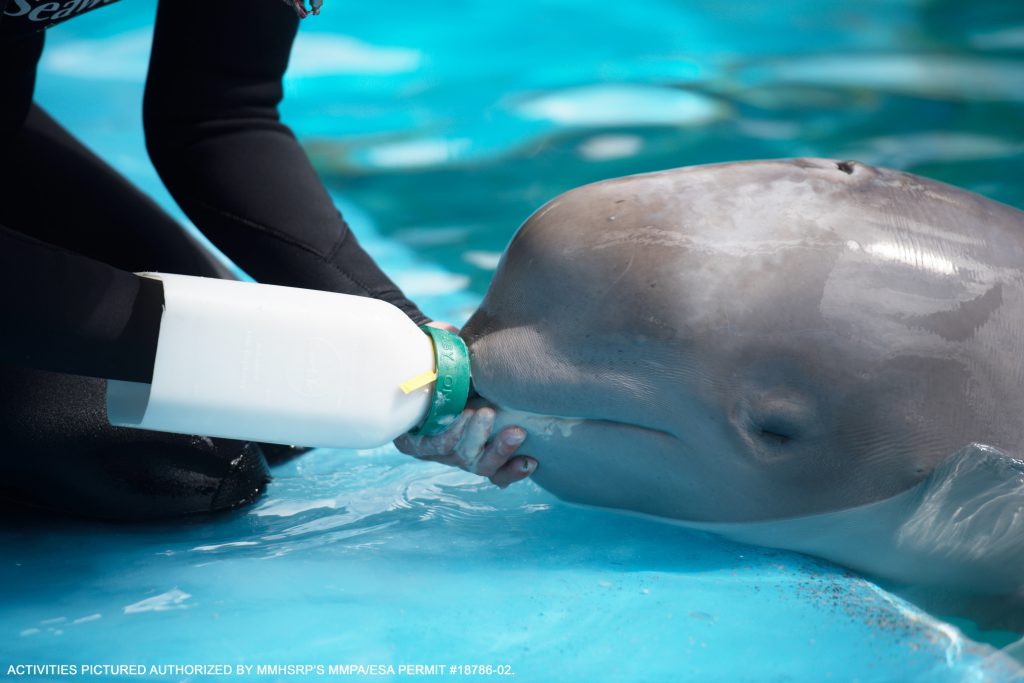Celebration for first rescued and rehabilitated Cook Inlet beluga calf

Rescue teams working with a once-stranded one-month old beluga whale calf, Tyonek, are celebrating one year of growth and significant milestones for the young whale.
Tyonek is the first of his species from Cook Inlet, Alaska – an endangered population of beluga whales – to be successfully rescued and rehabilitated after he was found stranded on a mudflat in September 2017. In the past year, he has transformed from being severely underweight into a developing one-year-old beluga calf.
From April 2018, Tyonek was introduced to new environments outside the support pool where he received around-the-clock care and began successful one-by-one introductions to all nine members of the SeaWorld San Antonio beluga whale pod.
Tyonek continues to achieve greater independence, demonstrating numerous common social behaviours and interactions, such as following other belugas and choosing which members of the pod he wants to interact with.
“We see Tyonek mimicking other whales’ behaviors and playing with toys,” said Dr. Steve Osborn, senior veterinarian at SeaWorld San Antonio. “Tyonek is also swimming and playing, sitting face-to-face, bumping and pushing up against other belugas, all positive signs as he continues to grow and learn.”
Tyonek has also begun to eat fish, like herring and capelin, as supplements to his daily bottle feedings.
Initially discovered measuring just 5’3” long and underweight at 140 pounds, Tyonek now weighs nearly 400 pounds and measures 6’10” long, with growth that is “right on track”, according to the animal care experts and veterinarians caring for him.
“Experts from several organisations collaborated to give Tyonek a second chance at life, and his growth, acceptance from the beluga pod and recent milestones are a testament to this team-curated care from many passionate and dedicated professionals,” said SeaWorld Chief Zoological Officer Dr. Chris Dold.
When discovered, experts from the Alaska SeaLife Center believed Tyonek had been stranded for several hours, fortunately without evidence of major physical trauma. From October 2017 to January 2018, experts from SeaWorld, Georgia Aquarium, Shedd Aquarium, Mystic Aquarium and Vancouver Aquarium supported the Alaska SeaLife Center and NOAA Fisheries in providing Tyonek with around-the-clock care.
In January 2018, NOAA Fisheries determined Tyonek non-releasable, since he remained nutritionally and socially dependent due to his young age at the time of stranding, and lacked both the survival and socialisation skills needed to be successful on his own in the wild.
The following month, NOAA Fisheries chose SeaWorld San Antonio as the calf’s new home because it was the “location best suited for Tyonek to thrive,” given the park’s ability to accommodate Tyonek’s social and medical needs, support all necessary transport, and contribute to scientific research on the species to help conservation efforts in the wild.
Prior to Tyonek’s arrival, SeaWorld San Antonio supported a population of nine beluga whales, with this whale pod including both adult females and young male beluga calves that proved important for Tyonek’s social development.
“Belugas are social creatures that need to be integrated into multi-generational groups to properly develop and thrive,” said Dr. Heather Hill, professor at St. Mary’s University in San Antonio.
SeaWorld is dedicated to beluga whale research, education and conservation, and the organisation has played an important role in assisting research in more than 20 published scientific studies about beluga whales since opening in 1988.
The endangered Cook Inlet beluga whale population has declined by nearly 75 percent since 1979, from about 1,300 whales to an estimated 328 whales in 2016. The rapid decline and dire status of the Cook Inlet beluga whale population makes it a priority for NOAA Fisheries and its partners to prevent extinction and promote recovery.

